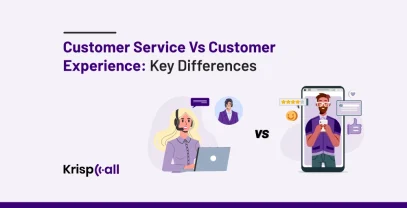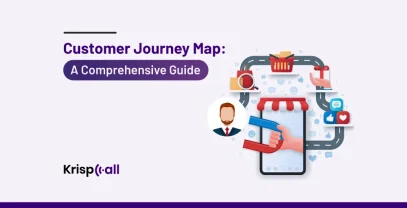Customer service remains a crucial part of many organizations and covers a broad spectrum of activities between a company and its clientele🤝. This includes everything from initial contact to ongoing support and even the resolution of issues or concerns during the customer service phase.
In the present scenario where companies are pushing themselves to come out and make their mark, knowing the actual meaning of customer service is essential if a business 💼wants to sustain itself, survive in the market, and stay loyal to its customers.
Having established the need to know more about customer service, let’s review its basics to define the concept and its essential components.🛠️
This blog will explore customer service and introduce you to its key traits and values. Moreover, we’ll discuss some ways and channels through which you can provide better customer service.
🔐 KEY HIGHLIGHTS
- Customer service refers to providing optimal solutions to customers’ needs, especially when they have a complaint or are facing difficulty.
- Customer service strategies include identifying and meeting the customers’ needs, constant help and answering, communication, satisfaction, feedback, continuous improvements, and more.
- Customer service is important as it creates and encourages loyalty and growth, keeps clients’ expectations in mind, sets the company apart, solves problems, and more.
- It is also essential for companies to provide high-quality customer service since they need to cover costs to address their customers’ needs.
What is Customer Service?
Customer service is the support, assistance, and advice a company provides to its customers before and after buying or using its products or services. It is critical to ensuring buyer satisfaction, retaining customers, and growing a business. Customer service is also considered a key aspect of servant leadership.
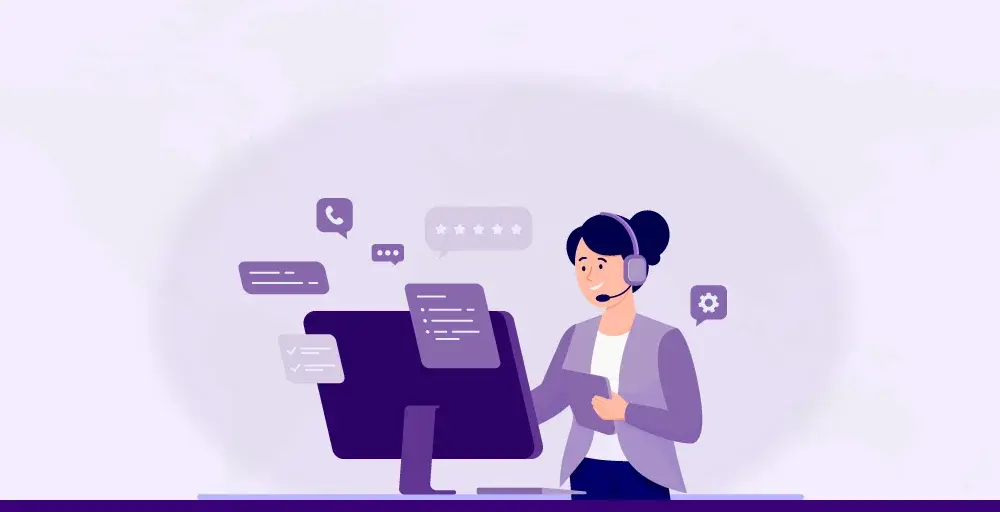
Customer service is not a mere business function confined to a specific division; it’s a mindset, an organizational promise to always provide customers with the utmost assistance and satisfaction.🌟
One of the several satisfying customer relations is to come back and get a reply soon after posing a question or a complaint. Favorable customers do not have to wait long before getting a response or word from their stock provider.
How Does Customer Service Work?
Customer care services are usually the intermediaries between consumers and business organizations through which other organizations can interact with a warrant.
Thus, interactions and the results of customers’ encounters with customer service representatives play a crucial role in determining customer perceptions of the company and its products. That said, let’s discuss how customer service works step-wise.
- Understanding Customer Needs: Customer service is a broad practice that involves acknowledging, identifying, and appreciating customers by meeting their wants, perceived needs, and expectations. This implies being responsive to their questions, problems, and opinions.
- Offering Solutions: Customer service also involves providing optimal solutions to customers’ needs, especially when they have a complaint or are facing some difficulty. This helps to involve planning, analysis, and the choice of an effective strategy for responding to disparate customers’ needs, as well as knowledge and understanding to guarantee the furnishing of satisfactory solutions to the customers.
- Maintaining Communication: Relational communication occurs throughout customer service since people should be as transparent as possible. Therefore, letting customers know the status of their queries or the progress of resolving an issue assures them, heightening their confidence.
- Ensuring Satisfaction: Customer service is the organizational function that seeks to maintain customer satisfaction by supporting customers. Evaluations refer to an extra commitment to over-deliver customers’ expectations, thus creating a positive brand experience.
- Handling Feedback: Customer service also involves listening to customers; addressing their concerns is vital in ensuring customer service. Such feedback enables the business to identify areas requiring change and to improve customer service quality.
👉 Take note: Customer service strategies include identifying and meeting the customers’ needs, constant help and answering, communication, satisfaction, feedback, continuous improvements, building relationships, performance checking, and compliance with regulations.
Why is Customer Service Essential?
There are several reasons why the customer or consumer is at the center, starting with the loyalty they show for the business, which guarantees repeated sales.
That is why customer service is important: it creates and encourages loyalty and the growth of the company as a whole. Delivering exceptional customer service through empowered teams builds customer loyalty and business success.
High-quality customer service is also essential as companies must cover costs to address customer needs effectively and want. Then again, there are other reasons that make customer service essential, some of which are:
- Building Customer Relationships: Customer care is a core business value in cultivating and developing favorable customer relations. From this perspective, when businesses work towards offering their clients the best services, people will become loyal to a particular company or organization.
- Customer Retention and Growth: Customer service is also important for growth and retention. With it, organizations have to focus on keeping existing customers satisfied for future business. Customers will always prefer returning to a company to make more purchases, especially if their friends and family recommend it directly.
- Meeting Customer Expectations: Many businesses exist to provide services, and customer satisfaction is, therefore, a key success factor that must be attained. Furthermore, if a company wishes to retain its customers, it must offer support for their problems through an individual approach and efficient help.
- Differentiating from Competitors: In the present complex and competitive environment, the top factor differentiating organizations is service quality to the customer or the client. This creates a unique selling proposition and can thus be a significant competitive advantage that any business may use in clinching and maintaining its customers.
- Resolving Customer Issues: Equally important in customer relationships is how organizations respond to customer complaints and concerns appropriately and on time. Through timely conflict management, corporations can solidify the perception that they possess excellent customer relations and effectively convert negative experiences into optimistic occurrences.
Traits of Good Customer Service
The key to corporate success in the highly competitive business world is offering customers the best service possible. Customer relations can help a firm stand out from others and positively impact business and customer relations.
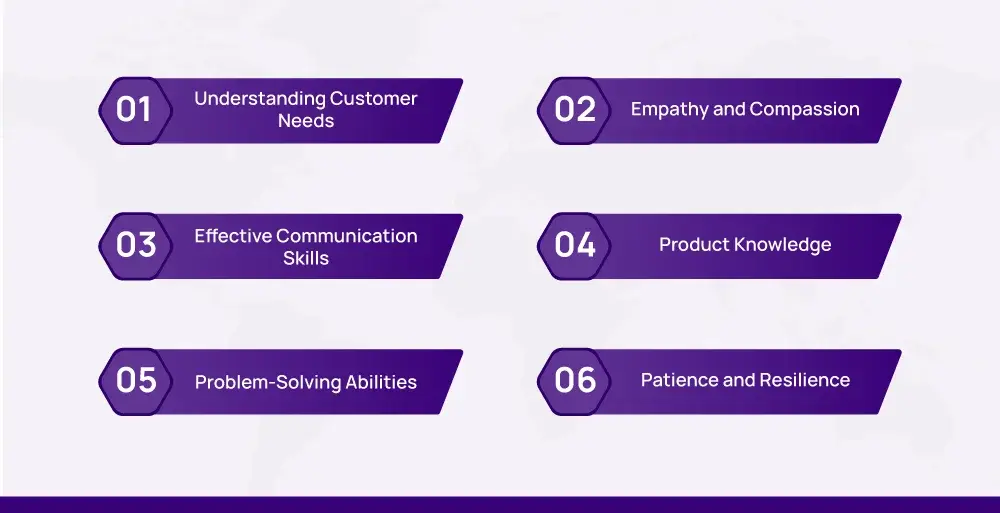
In other words, a company must analyze what makes top customer-focused organizational personalities and how they can be developed. That requires knowing the traits of good customer service. And what are those? Some of the most important ones are discussed below 👇
1. Understanding Customer Needs
Customer satisfaction is an essential requirement when offering services and products, and a crucial step to achieving this is understanding the customers. Hearing the customers’ voices helps management develop ways to suit customer needs and goals perfectly.
2. Empathy and Compassion
Patience and putting oneself in the customer’s shoes are essential qualities to incorporate in a customer service person. Understanding customers’ circumstances makes them comfortable since the interactions involve a level of trust, making the entire process healthier for the customer.
3. Effective Communication Skills
Effective communication must always be made before a problem is solved; it prevents the customer from complaining further and ensures they always feel valued. Examples of relevant skills are: The same goes for the employee’s ability to convey information to the client and handle their inquiries accordingly.
A dedicated customer service team with excellent systems is crucial to delivering exceptional customer service, as bad service can harm loyalty, making it important to provide excellent service.
4. Product Knowledge
Customer care services experts should have proper information regarding the products or services they offer to help the customer correctly. Ensuring the client has adequate knowledge of the company’s products boosts their confidence and satisfaction.
5. Problem-Solving Abilities
There is always a time when one is caught up in this job due to various factors when serving customers. Individuals trained correctly in problem-solving can respond to complicated situations and develop meaningful solutions acceptable to customers, improving their satisfaction levels and, thus, the loyalty levels they accord to the company.
6. Patience and Resilience
Many people who have worked in customer service lines know that patience and perseverance pay off. Therefore, one must keep calm and find the best solution, especially when talking with an angry or annoyed customer on the phone.
Patience is even more precious when facing a negative situation because knowing the situation can be better is good, even in the worst times.
How to Deliver Better Customer Service?
In the business environment, customer service is considered one of the primary objectives of any business that aims to succeed. The key approaches to customer service optimization are defined to develop solid and lasting client relations.
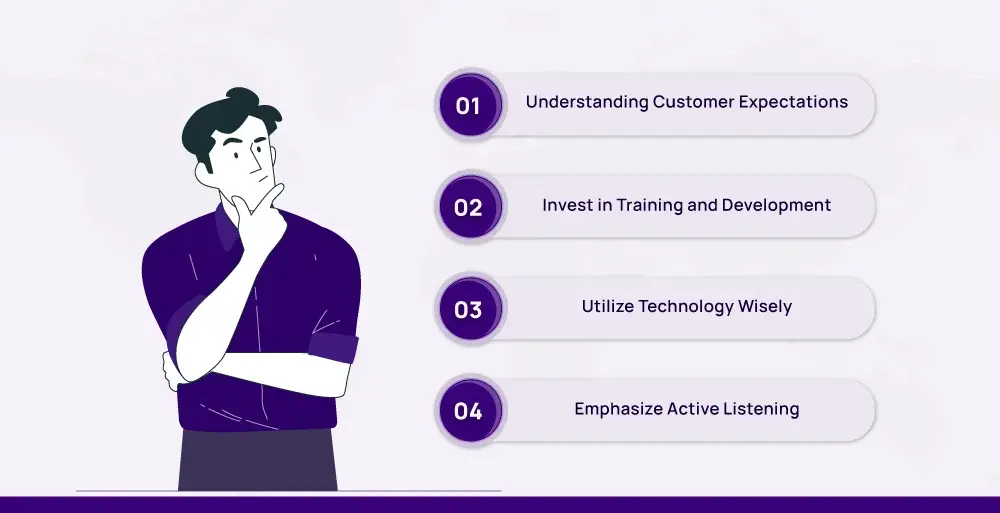
To do that, you must be aware of doing certain things, some of which are:
1. Understanding Customer Expectations
One critical factor that will improve the efficiency of the interaction is the ability to predetermine and understand customer needs. This means that by reviewing previous experiences and gathering valuable comments, a customer service representative can more easily address their target clients appropriately and deliver great customer service.
2. Invest in Training and Development
It is also essential to consider that associated human costs, including comprehensive training and development of customer service representatives, should not be conservative. Ensuring staff is highly trained and informed enables them to professionally handle aspects of their call of duty.
3. Utilize Technology Wisely
Information technology is a crucial element in the present-day service industry. By using customer service systems like Customer Relationship Management (CRM) systems and live chat services, businesses can front-end different operations and efficiently deliver customer service to consumers in an easily accessible manner.
4. Emphasize Active Listening
Parasocial listening, also known as active listening, is essential in customer service. Each representative should effectively listen to a customer’s complaint, question the customer to understand better, and express concern about the customer’s issue.
Customer Service Channels
There are many communication channels, including basic ones like the phone and e-mail and advanced ones like social media and live chat, and all have strengths and weaknesses.
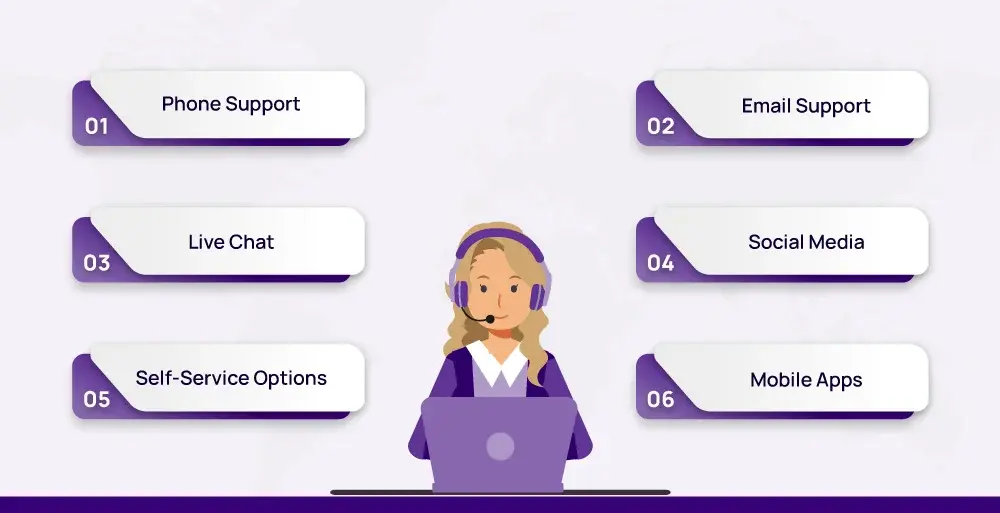
1. Phone Support
Telephone complaints are one of the current economy’s most popular complaint management techniques. It provides live support and allows customers and representatives to communicate with each other mutually. However, it can be less efficient and unsuitable when numerous details must be documented for more challenging problems.
2. Email Support
Customers can seek a specific solution through email support in a particular area of interest. Since it offers deeper analysis and documentation of the conversations throughout, it is favorable for discussing complex issues. However, there are drawbacks: response times can be highly unpredictable, and the user may never see the email or not bother to reply.
3. Live Chat
Live chat is one of the methods of online customer support that involves text-based messaging to facilitate actual time communication between customers and representatives. They take time to respond to customer complaints and queries, assisting businesses in providing quick and quality services.
While it does not need much expertise, it requires consistent and constant resources to ensure availability and might not be ideal for most complex cases.
4. Social Media
Social media as customer service has become a trend among customers, such as using Facebook or Twitter. They allow customers to complain or express their opinions about products and services. On the same note, they enable businesses to promptly address such complaints or opinions.
Nonetheless, for a firm, the use of social media is easier to handle because it entails controlling social media channels while responding to mentions at the right time to mitigate the spread of other brands’ negative remarks.
5. Self-Service Options
FAQs, knowledge centers, IVR, and tutorials are friendly tools that allow customers to find answers to frequently asked questions independently. Engaging customers through these lowers the workload expectation on customer service agents and offers customers quick access to information.
However, these methods need to be consistently updated now and then to ensure they are relevant and as effective as ever.
6. Mobile Apps
The third communication channel is the opportunity to create mobile applications to provide customer service. This means that users can access support material using their mobile devices, reducing the efforts needed when seeking support. Nevertheless, deploying and sustaining a mobile application entails a lot of capital investment and constant replenishment of resources.
Common Challenges While Providing Good Customer Service
Customer service, as we all know, is an essential factor in business, but the service comes with its own set of issues. Here are some common challenges companies face when striving to deliver excellent customer service:
- High Customer Expectations: Consumers demand quick and efficient service with product customization, multichannel, and multi-touchpoint orientation, which enterprises find difficult to meet quickly and sustainably.
- Employee Training and Development: One potential difficulty is properly educating frontline employees to address all possible and common customer questions and complaints, which involves enhancing company training efforts and materials.
- Communication Barriers: Language, culture, and other factors that result in misconceptions could significantly affect the flow of communication between customers and representatives, causing customer impatience and dissatisfaction.
- Managing Customer Complaints: Complaint management entails case sensitivity, problem-solving ability, and patience since the customers to be dealt with may be very angry or dissatisfied.
- Consistency Across Channels: Customers expect that the level and tone of communication should be consistent regardless of the medium. Also, it is important to maintain the standard and quality of communication to ensure long-term success.
- Technological Limitations: A perceived deficiency of tools and systems or overreliance on such technologies can hamper good customer service, especially when dealing with customer concerns or designing custom-made experiences.
- Staff Turnover and Burnout: Staff turnover and burnout are critical considerations because they can lower the quality of customer interaction. If many employees resign, their inexperienced successors may take time to adapt to their positions and perform optimally, or staff members may burn out if they are overburdened with work.
- Balancing Automation and Personalization: On the one hand, increasing the usage of automation reduces errors, increases speed, and thus helps deliver the right messages to the right audience. On the other hand, being too focused on automation sometimes turns the audience into statistic numbers, where no individuality is found. So its to keep a balance between the two aspects.
- Meeting Service Level Agreements (SLAs): Ensuring that the availability of services and response times are acceptable and can meet the planned service level agreements can be further damped by periods of high use such as rush hour or periods of high traffic volume that would necessitate careful balancing of available resources.
- Adapting to Changing Customer Needs: Consumers and business customers can be unpredictable in their demands and desires for some services. To be competitive and effective, businesses must adjust their customer service policies.
These challenges cannot be solved by just reflection and acknowledgment but by active involvement, resource allocation, training, and embracing customers’ priorities.
Conclusion
Customer service can be considered a foundation upon which any business is built as it assists in creating healthy relationships with clients, solving their issues, and thus meeting their expectations. From customer self-service options to social media engagement, effective customer service goes beyond resolving issues; it’s about creating exceptional customer experiences throughout the journey.
Customer service is crucial for business success. Good customer service leads to satisfaction, loyalty, and retention, while poor service can harm a brand reputation. Effective customer service experiences require exceptional support, problem-solving skills, and product knowledge. If everything is done right, businesses can create loyal customers, reduce churn, and gain a competitive advantage by prioritizing customer service.
FAQs
What are the essential skills needed for a customer service agent?
A good customer service agent should have good communication and interpersonal skills, good listening skills, and the ability to be patient, tactful, flexible, and experienced in the product offered.
What do you mean by good customer service?
Effective customer service means that the customer receives suitable service to meet the need or solve the problem at the appropriate time with professionalism and care for the customer’s sentiments and feelings.
How can you handle an irate customer?
Dealing with an angry customer involves understanding the client, seeking permission to speak and listen to the grievances, expressing understanding for their anger and situation, offering an apology, and going back to find the best solution.
How does a business measure the efficiency of customer service?
Different indicators like response time, resolution time, customer satisfaction score, net promoter score, and what the customer is likely to tell other individuals are used to determine how effective customer service is in a business.



